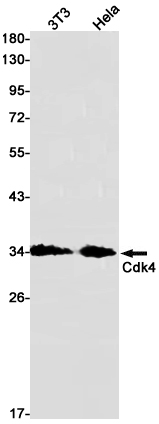
| WB | 咨询技术 | Human,Mouse,Rat |
| IF | 1/20 | Human,Mouse,Rat |
| IHC | 咨询技术 | Human,Mouse,Rat |
| ICC | 1/50-1/200 | Human,Mouse,Rat |
| FCM | 咨询技术 | Human,Mouse,Rat |
| Elisa | 咨询技术 | Human,Mouse,Rat |
| Aliases | CMM3; PSK-J3 |
| Entrez GeneID | 1019 |
| WB Predicted band size | Calculated MW: 34 kDa; Observed MW: 34 kDa |
| Host/Isotype | Rabbit IgG |
| Antibody Type | Primary antibody |
| Storage | Store at 4°C short term. Aliquot and store at -20°C long term. Avoid freeze/thaw cycles. |
| Species Reactivity | Human,Mouse |
| Immunogen | A synthetic peptide of human Cdk4 |
| Formulation | Purified antibody in TBS with 0.05% sodium azide,0.05%BSA and 50% glycerol. |
+ +
以下是3-4篇关于CDK4抗体的参考文献及其简要摘要:
---
1. **文献名称**:*CDK4/6 Inhibitors in Cancer Therapy: A Novel Class of Immunomodulators*
**作者**:Goel, S., et al.
**摘要**:本文探讨了CDK4/6抑制剂(如帕博西尼)在癌症治疗中的作用,揭示其通过阻断细胞周期进程抑制肿瘤生长,同时增强抗肿瘤免疫反应的机制。研究基于临床前模型和患者样本,验证了CDK4抗体在联合免疫疗法中的潜力。
---
2. **文献名称**:*Targeting CDK4/6 in Breast Cancer: From Molecular Mechanisms to Clinical Benefits*
**作者**:Finn, R.S., et al.
**摘要**:研究聚焦CDK4/6抑制剂在乳腺癌治疗中的应用,分析了CDK4抗体如何通过抑制Rb蛋白磷酸化阻断细胞周期G1/S转换,并总结临床试验数据,证明其对激素受体阳性乳腺癌患者的显著疗效。
---
3. **文献名称**:*CDK4 Phosphorylation Status and Resistance to Palbociclib in ER+ Breast Cancer*
**作者**:Yang, C., et al.
**摘要**:该研究通过蛋白质组学分析,发现CDK4磷酸化水平与帕博西尼耐药性相关,提出基于CDK4抗体检测磷酸化状态可作为预测治疗反应的生物标志物,为个体化治疗提供依据。
---
4. **文献名称**:*A Monoclonal Antibody Targeting CDK4 Displays Selective Antitumor Activity in Melanoma Models*
**作者**:Zhang, J., et al.
**摘要**:报道一种新型抗CDK4单克隆抗体的开发,其在黑色素瘤异种移植模型中显示出特异性抑制肿瘤生长的效果,机制涉及阻滞细胞周期并诱导凋亡,提示其作为靶向治疗的潜在价值。
---
以上文献涵盖CDK4抗体的分子机制、治疗应用及诊断价值,可供快速参考。如需全文链接或扩展内容,可进一步提供具体需求。
CDK4 (Cyclin-Dependent Kinase 4) is a serine/threonine kinase critical for cell cycle regulation, primarily driving the G1-to-S phase transition. It forms a complex with cyclin D to phosphorylate retinoblastoma (Rb) protein, releasing E2F transcription factors to promote cell cycle progression. Dysregulation of CDK4. through amplification, overexpression, or mutations, is implicated in various cancers, including melanoma, breast cancer, and sarcoma, making it a therapeutic target.
CDK4 antibodies are essential tools in research and diagnostics. They enable detection of CDK4 expression levels in tissues or cell lines via techniques like Western blotting, immunohistochemistry (IHC), and flow cytometry. Specific antibodies can distinguish between active (phosphorylated) and inactive forms, aiding studies on cell cycle deregulation in cancer. In clinical settings, CDK4 antibodies help identify patients with CDK4-altered tumors who may benefit from targeted therapies, such as CDK4/6 inhibitors (e.g., palbociclib, ribociclib). These inhibitors, combined with hormone therapy, have improved outcomes in hormone receptor-positive breast cancer.
Additionally, CDK4 antibodies are used to monitor therapeutic efficacy and resistance mechanisms. Cross-reactivity with other CDKs (e.g., CDK6) is a key consideration during antibody validation. Ongoing research explores CDK4's role in senescence, metabolism, and immune modulation, further expanding the utility of these antibodies in both basic and translational contexts.
×